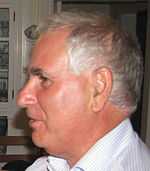Tom Rapoport
| Tom Rapoport | |
|---|---|
|
Tom Rapoport | |
| Born |
June 17, 1947 Cincinnati, Ohio |
| Residence | Brookline, Massachusetts |
| Citizenship | United States, Germany |
| Fields | biochemistry, cell biology |
| Institutions | Harvard Medical School, Howard Hughes Medical Institute |
Tom Abraham Rapoport (17 June 1947)[1] is a German-American cell biologist who studies protein transport in cells.
He has been a professor at the Harvard Medical School since 1995, and an HHMI investigator since 1997. He was a member of the Akademie der Wissenschaften der DDR from 1988 until 1992 (when it was dissolved),[1] he has been a member of the German Academy of Sciences Leopoldina since 2003,[2] a member of the US National Academy of Sciences since 2005,[3] and he is a fellow of the American Academy of Arts and Sciences and the American Association for the Advancement of Science.
Biography
Rapoport was born in Cincinnati in 1947.[1] His parents had fled the Nazis, and when he was three years old they returned first to Austria and then to East Germany in 1951.[3] His brother is mathematician Michael Rapoport. He received his PhD on mathematical modeling of the kinetics of inorganic pyrophosphatase in 1972 from Humboldt University. He worked in the lab of Peter Heitmann, and his father, Samuel Mitja Rapoport, was head of the Institute of Physiological Chemistry.[3] At Humboldt he collaborated with Reinhart Heinrich on the mathematical modeling of glycolysis in red blood cells, leading to the establishment of metabolic control theory on which they submitted a joint 'habilitation' thesis.[4] At the same time he worked with Sinaida Rosenthal, a former student of his father, on cloning the insulin gene from carp.[3]
In 1979 he moved to the Zentralinstitut für Molekularbiologie der Akademie der Wissenschaften der DDR, later called the Max Delbrück Center for Molecular Medicine, where he became a professor in 1985. After the reunification of Germany, Rapoport said he was turned down for professorships for "political reasons";[3] New Scientist reported that it was his membership of the Communist Party in East Germany that led some members of the board of trustees of the MDC to oppose him being given a professorship.[5] He moved to the US in 1995. He studies several aspects of cellular secretion, including the mechanisms by which newly synthesized proteins are translocated from the cytosol to the lumen of the endoplasmic reticulum by the Sec61 complex (also known as the translocon), how misfolded secretory proteins are degraded by endoplasmic reticulum associated protein degradation (also known as ERAD), and how reticulons and related proteins regulate the morphology of the endoplasmic reticulum.
Selected research articles
- Voeltz, GK; Prinz WA; Shibata Y; Rist JM; Rapoport TA (10 February 2006). "A class of membrane proteins shaping the tubular endoplasmic reticulum". Cell 124 (3): 573–586. doi:10.1016/j.cell.2005.11.047. PMID 16469703.
- Ye, Y; Shibata Y; Yun C; Ron D; Rapoport TA (24 June 2004). "A membrane protein complex mediates retro-translocation from the ER lumen into the cytosol". Nature 429 (6994): 841–847. doi:10.1038/nature02656. PMID 15215856.
- Van den Berg, B; Clemons WM Jr, Collinson I, Modis Y, Hartmann E, Harrison SC, Rapoport TA (1 January 2003). "X-ray structure of a protein-conducting channel". Nature 427 (6969): 36–44. doi:10.1038/nature02218. PMID 14661030.
- Görlich, D; Rapoport TA (19 November 1993). "Protein translocation into proteoliposomes reconstituted from purified components of the endoplasmic reticulum membrane". Cell 75 (4): 615–630. doi:10.1016/0092-8674(93)90483-7. PMID 8242738.
- Heinrich, R; Rapoport TA (15 February 1974). "A linear steady-state treatment of enzymatic chains. General properties, control and effector strength". Eur J Biochem. 42 (1): 89–95. doi:10.1111/j.1432-1033.1974.tb03318.x. PMID 4830198.
Awards
- 2004 Awarded Otto Warburg Medal of the German Society for Biochemistry and Molecular Biology
- 2005 Awarded Max Delbrück Medal of the Max Delbrück Center for Molecular Medicine.[6]
- 2011 Awarded the Schleiden Medal from the Leopoldina[7]
References
- ↑ 1.0 1.1 1.2 "Tom Abraham Rapoport". Berlin-Brandenbergische Akademie der Wissenschaften (in German). Retrieved 4 November 2010.
- ↑ [http://www.leopoldina-halle.de/cms/de/akademie/organisation/mitgliederversammlung/mitgliederliste.html?tx_leomemberlist_pi1[showUid]=976&cHash=588dc94628 "Tom A. Rapoport"]. Akademiemitglieder (in German). Deutsche Akademie der Naturforscher Leopoldina - Nationale Akademie der Wissenschaften. Retrieved 7 November 2010.
- ↑ 3.0 3.1 3.2 3.3 3.4 Davis, Tinsley H. (4 October 2005). "Profile of Tom A. Rapoport". Proc Natl Acad Sci U S A (The National Academy of Sciences) 102 (40): 14129–14131. doi:10.1073/pnas.0506177102. PMC 1242311. PMID 16186492.
- ↑ Rapoport, Tom. "Reinhart Heinrich — An Unassuming Intellectual Giant". Journal of Theoretical Biology. Retrieved 7 November 2010.
- ↑ Charles, Dan (5 April 1997). "The wall that won't come down - Eight years after unification, the Cold War lingers on in laboratories across Germany". New Scientist. Retrieved 4 November 2010.
- ↑ "Harvard Biochemist Tom Rapoport Awarded Max Delbrück Medal in Berlin". Max Delbrück Center for Molecular Medicine (MDC) Berlin-Buch. 1 December 2005. Retrieved 4 November 2010.
- ↑ http://www.leopoldina.org/en/press/press-releases/press-release/press/986/
External links
- Profile at Harvard Medical School
- Profile at the HHMI
- Rapoport laboratory website
- Tom Rapoport, A Preliminary Report on My Life in Science, Mol. Biol. Cell Vol. 21, 3770–3772, November 15, 2010
- NIH Seminar Series, Mechanisms of Protein Translocation Across Membranes, May 20, 2009 on YouTube
